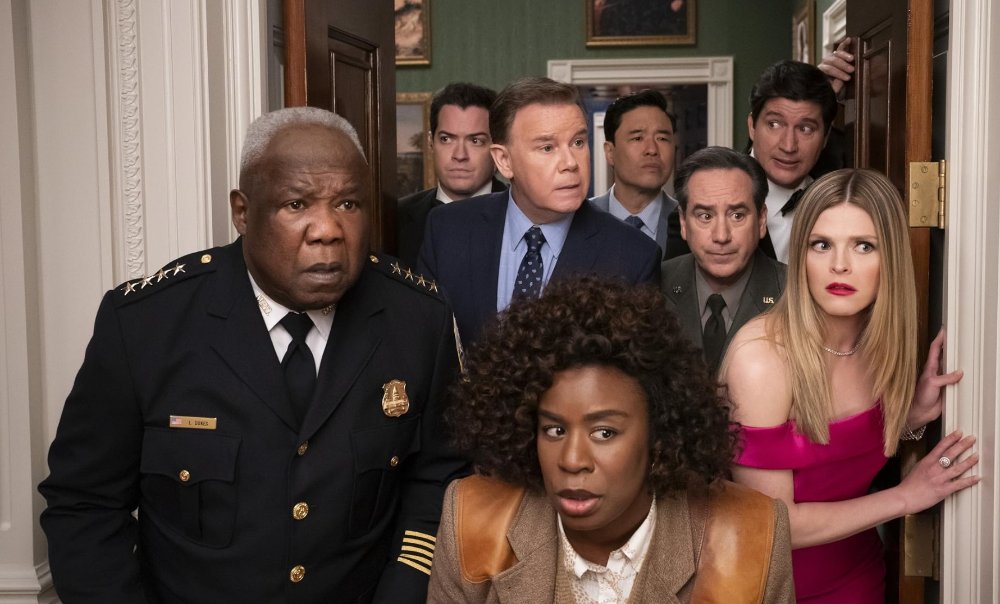Netflix is running a new whodunit, The Residence, about a murder in the White House. It stars Uzo Aduba as the relentless, no-nonsense detective, Cordelia Cupp. It’s great fun. Witty and fast-paced, the shows are well acted by a large cast.
Spoiler Alert: Although I will not name the culprit, I will give sufficient description that you will probably be able to figure it out.
Not only does the final installment of the eight episodes reveal the actual murderer, it contains another surprise, one I didn’t see coming — a clever, name-no-names commentary on current politics and culture.
The White House, known by its staff as “The House,” is an operation steeped in tradition, unwritten norms, and respect for both. But most of all, loyalty — though not primarily to whoever happens to be the President — but to “The House” itself. All of these qualities are epitomized by the Chief White House Usher and murder victim, A. B. Wynter, brilliantly played by Giancarlo Esposito.
As “Chief Usher” Wynter is the head of staff, the one who runs the show. For Wynter, there’s a right way to do things and a wrong way. He insists on the right way, and isn’t afraid to let his minions know it when they haven’t measured up. As such you might call him “up tight.” He is called worse by various members of the staff at different times, which means there are plenty of people with motives.
But bottom line, Wynter is an institutionalist who loves this particular institution, “The House.” He knows how flawed its various occupants have been, just as he knows the foibles of many of his staff. And yet, he loves The House and he loves its people. Wynter’s love is not expressed by saying “awesome” or “perfect” every third word, nor with frequent “atta-boys/girls.” Pretty much a Stoic, Wynter demonstrates his love by doing all in his power to make the thing work, and in doing so to bring honor on the house while ennobling his people as they serve a larger cause.
Into the mix of a long-serving staff comes a new White House Social Secretary who is bent on changing things. She regards “The House” as sadly out of date and really in need of a complete makeover, top to bottom. She gets the job because her exceedingly wealthy parents are big contributors to the President. Too wildly wealthy to have ever known privation, she is both clueless and careless about the ways that norms and traditions convey care and respect. She is disrupter of everything: decor, holiday traditions, program, communication protocols, the operation of state dinners, etc. She can seem nice, even charming, but her heart is devoid of love.
When Cordelia Cupp finally delivers her revelation as to the murderer’s identity, she frames it in the context of one who loved and respected institutions (“The House”) and love for its people, versus fanciful and cruel disruption done “because I can.” Sound familiar?
But that’s not the whole of it. In the course of the drama, almost everyone in the house, both staff and residents, are revealed to have had some conflict with Wynter and thus some motive for his murder. Moreover, there is among the crew the usual back-biting, secrets, and self-seeking. In some sense, they all bear a portion of the guilt, even if only one of them was the actual murderer.
While the show most clearly indicts those guilty of a casual and selfish disregard for tradition and institutions and for the norms of decency and respect that make life bearable, it also seems, as each cast member takes their turn under Cupp’s scrutiny that, in a certain respect, everyone in the house played a part in the murder.
So, if we are applying this to our current politics and culture, a finger is pointed at Trump, Musk, and all the other happy warriors of disruption, self-promotion, and cruelty. But the show may also be saying they had enablers, a whole house-full. While the murder may have been committed by one person, most everyone in The House bears some responsibility for the mess. Blinded by personal agendas and ambitions, they have not cared sufficiently about the common trust they steward.
Discover more from Post Alley
Subscribe to get the latest posts sent to your email.

Thanks for the excellent, if revealing, overview, Anthony. Just started watching and am delighted with Uzo’s witty lead performance.
Great write up for a great show. I loved your analysis!
I’m also enjoying the series. Besides the whodunnit tale, I was struck by the kind of a White House it shows. The president is gay and his husband is the First Gentleman and the White House staff is full of diversity. At the point I’m at in the saga, there are few admirable characters among the top White House echelon, but below stairs we see many hard working dedicated people. You can’t help but wonder how the ushers, butlers, plumbers, cooks et al are dealing with the current occupant and his MAGA cronies. Clearly Shonda Rhimes conceived the series before the election.
This is a good review, and you bring up insights I hadn’t considered. Anyone who has access to Netflix should see it. It’s witty, well-written, and even has Hugh Jackman. . . . or does it? An entertaining fable for our time.